calsfoundation@cals.org
Association of Community Organizations for Reform Now (ACORN)
aka: ACORN
The Association of Community Organizations for Reform Now (ACORN) was a nationally known organization that advocated for low- and moderate-income families and communities. ACORN began in Arkansas in 1970, when it was founded by Wade Rathke and Gary Delgado. It filed for bankruptcy and disbanded in 2010.
George Wiley of the National Welfare Rights Organization (NWRO) sent civil rights worker Rathke to Little Rock (Pulaski County) in 1970, after training him at Syracuse University. From this training, Rathke and Delgado developed ACORN, an organization created to help develop leaders in low-income communities in Arkansas. They were attracted to Arkansas by several features, including the poverty of the state—which in 1970 had a median income under $6,000 and a large welfare-eligible population. Also, the state had a centrally located state capital and was thirty-five percent African American. The organizers also were impressed that the state’s history included reform-minded organizations such as the Southern Tenant Farmers’ Union, and that the state had recently elected reformer Winthrop Rockefeller as governor.
Rathke’s first exercise was an attempt to assess welfare recipients’ most basic needs, such as clothing and furniture (according to Arkansas welfare laws, families on welfare were entitled to a $40 allowance for furniture). From the beginning, ACORN’s agenda was broad, encompassing such issues as school lunches, unemployment, healthcare, and the environment. Throughout its early years, ACORN was staffed primarily by middle-class young people who worked for poverty-level wages. Rathke’s first office was free space at the Arkansas Council on Human Relations. He also worked closely with the Arkansas Welfare Rights organization, battling the North Little Rock (Pulaski County) school district, which was not complying with federal regulations requiring free lunches for low-income students, even though the funding for the lunches was provided by the U.S. government.
Though Rathke saw ACORN as an umbrella group under which many groups would come together and cooperate toward common goals, this was not always the case. From the beginning, it was an uphill battle for ACORN, which faced both external and internal struggles. One early stumbling block was that key welfare rights members wanted ACORN to be solely a welfare rights group and thus withdrew from the organization. ACORN reached out to other groups, adding to its ranks the Vietnam Veterans Organizing Committee (VVOC) and the Unemployed Workers Organizing Committee (UWOC).
ACORN pursued its goals through negotiation, legislation, voter participation, and demonstration. From 1972 through 1974, ACORN sponsored a “Save the City” campaign in Little Rock dealing with working-class homeowners’ worries that their communities were about to be overrun by traffic problems. With ACORN’s help, the campaign succeeded in achieving a new city park and a new stoplight for the neighborhood. When development of a new highway, Interstate 630, cut a swath through the community, some families were relocated and were provided social services. In addition, local real estate companies were engaging in a practice known as blockbusting—trying to trigger the turnover of white-owned houses to African Americans in panic selling—in the Oak Forest section of Little Rock. ACORN was able to put a halt to this practice.
As a result of the success of the “Save the City” campaign, ACORN expanded beyond Little Rock, establishing six regional offices throughout the state, including offices in Pine Bluff (Jefferson County), Fayetteville (Washington County), and Fort Smith (Sebastian County). ACORN also set about helping to organize farmers who were concerned about the effect of sulfur emissions on their fields from a proposed Arkansas Power and Light (AP&L) coal-burning plant near Redfield (Jefferson County). ACORN brought public pressure to bear on Governor Dale Bumpers, and the Public Service Commission ruled that the plant needed to be smaller after a study by Harvard University (an AP&L stockholder) was released on the dangers of sulfur emissions.
In 1972, ACORN entered the realm of electoral politics, with its Political Action Committee publicly supporting two candidates for Little Rock School Board. In 1974, ACORN members ran for Pulaski County Quorum Court, winning the Democratic primary and the general election. Of 250 candidates supported by ACORN that year, 195 were elected.
In 1975, with new branches opening in Texas and South Dakota, ACORN expanded beyond Arkansas to become a multi-state operation. Over the years, it increased its number of offices and its activities, becoming an international entity in 2004 with offices in Canada, Peru, and the Dominican Republic. ACORN received a considerable amount of favorable publicity due to its response to the needs of the citizens of New Orleans, Louisiana, following Hurricane Katrina in 2005.
In 2008, ACORN had chapters in more than 100 cities across the United States and 350,000 member families. Following the election of Barack Obama as president of the United States in November 2008, ACORN (which had supported his campaign) received much negative attention, including accusations of improprieties based on heavily edited undercover videos of conversations with ACORN staff in eight cities. Rathke’s brother, Dale, was accused of embezzling nearly one million dollars from ACORN. The U.S. Congress withdrew federal grants from ACORN, and many of its affiliates disassociated themselves from the organization. As a result, ACORN declared insolvency and disbanded in 2010. Many of its former affiliates continue to operate under various names.
For additional information:
Arnold, Margaret, and John S. Miller. “ACORN: Under Attack and On the Go.” Arkansas Times (November 1979): 104–114.
Atlas, John. Seeds of Change: The Story of ACORN, America’s Most Controversial Antipoverty Community Organizing Group. Nashville, TN: Vanderbilt University Press, 2010.
Delgado, Gary. Organizing the Movement: The Roots and Growth of ACORN. Philadelphia: Temple University Press, 1986.
Fisher, Robert, ed. The People Shall Rule: ACORN, Community Organizing, and the Struggle for Economic Justice. Nashville, TN: Vanderbilt University Press, 2009.
Lackey, Joseph. “On the Doorstep of Oak Forest: Blockbusting and a Residential Response.” Pulaski County Historical Review 64 (Fall 2016): 96–95.
Richard S. Drake
Fayetteville, Arkansas
Staff of the CALS Encyclopedia of Arkansas
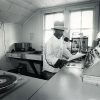 KABF
KABF Pugh, Johnnie B.
Pugh, Johnnie B.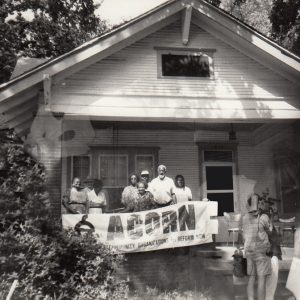 ACORN Action
ACORN Action 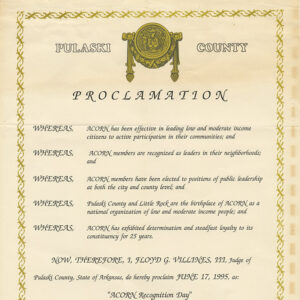 ACORN Certificate
ACORN Certificate 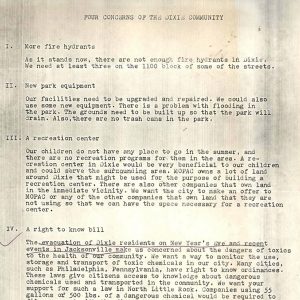 Four Concerns of the Dixie Community
Four Concerns of the Dixie Community 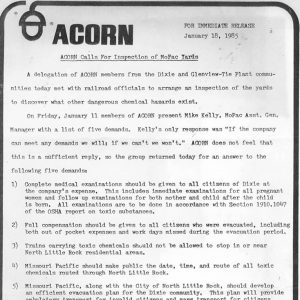 Dixie ACORN Call for Inspection Document
Dixie ACORN Call for Inspection Document 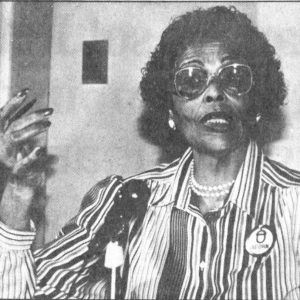 Johnnie B. Pugh
Johnnie B. Pugh 



Comments
No comments on this entry yet.